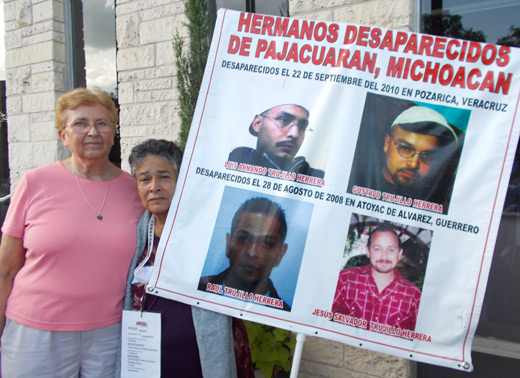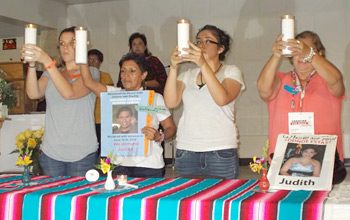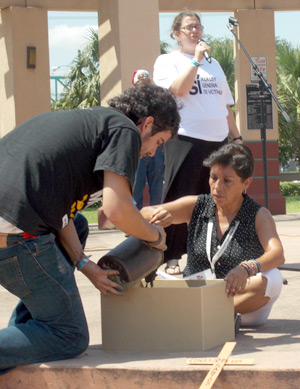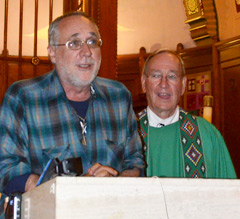 |
| Sister Ceil Roeger, OP, with Maria holding a banner of her four sons, who were “disappeared” |
Caravan for Peace
Mexican Dominicans travel from California to D.C.
Reflections from San Antonio, Houston, Atlanta and Chicago. Contributors: Kathy Long, OP; Ceil Roeger, OP; Liz Scully, OP; and Chuck Dahm, OP
On Aug. 12, 2012, a broad coalition of organizations in the U.S. joined the Mexican Movement for Peace with Justice and Dignity to embark on the “Caravan for Peace.” The caravan was led by Javier Sicilia, Mexico’s ‘poet laureate. It left Tijuana, Mexico, for San Diego and a journey that would take them across the United States to Washington, D.C. Events were planned for many cities along the way. Members of the Dominican order were present at several of the events assisting with organizing and/or attending the events. Given that Texas is a border state as well as a large state, the caravan visited eight cities.
Sister Kathy Long, OP (Sinsinawa) was in San Antonio when the caravan arrived from Brownsville, Texas, at St. Leonard’s parish on the south side of San Antonio on Friday, Aug. 24. Kathy had met many of the caravan participants in Cuernavaca in April. They gathered at the CCIDD center where they had three days of sharing and planning which resulted in the U.S. caravan. The members of the caravan were treated to a pot luck supper and joined in table conversations with their San Antonio hosts.
 |
| Prayer in San Antonio |
After the supper, numerous testimonies were given. Teresa from Oaxaca shared with all that her sister was disappeared in 2006. She asked “What is the use of the helicopters of Plan Merida if there is no security?” We want to build peace. Arturo lost his brother and he stated that this caravan comes with the pain of Mexico. We do not want any more weapons from the United States. Guadalupe shared that she lost her oldest son just one year ago. He is disappeared, perhaps, alive, perhaps killed. In her agony she lamented these criminals have given us an interminable ache. Carlos talked about his four brothers who were disappeared from Michoacán in September 2010. Carlos’ mother Maria and his other brother held a large banner of the four disappeared brothers. You can imagine the agony of Maria losing four sons. Maria would tell the story while her sons held the banner on Sunday in Houston. Women from San Antonio talked about the disappearances of the husbands and sons in Mexico in the last year. They begged for help to find them with a hope they may still be alive.
From San Antonio the caravan traveled to Austin before going on to Houston. The Caravan buses rolled onto the motherhouse grounds of the Dominican Sisters of Houston around 11 a.m., Sunday, Aug. 26 and were greeted by members of the organizing committee. A light lunch was served and the caravanistas (a term coined by a member of the organizing committee) were welcomed to Houston with an overview how through various struggles the Houston community has come together in solidarity to work for justice. To do this, Pancho Arguelles used different flutes as a metaphor for what we are trying to do in working together… many issues, many communities working together in this case to end the “war on drugs.”
From the motherhouse, the caravan journeyed to St. Paul Methodist Church for a town hall forum. It was here that we heard Maria’s heart-wrenching story as she told of losing four sons to violence in Mexico. She and her surviving sons are carrying banners with pictures of the victims as they make the journey from San Diego to Washington D.C. The forum was billed as a black/brown dialogue. Following a clip from a speech given by Michelle Alexander, author of the book, “The New Jim Crow: Mass Incarceration in the Age of Colorblindness,” where she describes how in the U.S. war on drugs as negatively impacted the African-American community, we heard the stories of local African-American men. These men told of how they or their children were impacted by drugs and the “war on drugs.”
Other Houston events included a community dinner and candlelight vigil before the buses headed back to the motherhouse for a night of rest. Sister Ceil Roeger, OP, was on the planning team to receive the caravan. The Dominican Sisters of Houston and the Galveston Houston Archdiocese provided housing for the caravanistas. Sister Kathy Long drove from San Antonio and joined the caravan Sunday afternoon in Houston. She was a great help in assisting people to their rooms at the archdiocesan retreat center adjacent to the sisters’ property, as well as helping us make a personal connection with the people and their stories.
The sisters provided a light breakfast Monday morning while volunteers from “La Juventud de Ayer y Hoy” packed lunches for the bus ride to Mississippi.
Hurricane Isaac interrupted the plans for the caravan’s visit to New Orleans, and plans were made to head for their stop in Jackson, Mississippi. Before they headed for Jackson, a prayer with a blessing was held at Our Lady of Guadalupe Church. Here women who were to give testimony at the press conference that followed laid flowers at the feet of Our Lady of Guadalupe. At the press conference, Lourdes talked of her son who was shot five times in the back while sitting at his computer about 10 p.m. one evening in 2010. Olga Reyes lost five family members. Her mother and sibling have been human rights defenders for many years in Chihuahua, northern Mexico. Sucario, an Indigenous Tzotzil from Chiapas who spent five five years in jail, was accused of having an AK 47 rifle and grenades and killing someone there. He explained the weapons are not only used to kill but also to criminalize the innocent. After a 35-day fast, he was declared innocent and released.
 |
| Burying the weapons |
After these moving testimonies, a power saw was used by Javier Sicilia and others to cut an AK-47 rifle and a hand gun into pieces. The crowd was silent as the rifle and hand gun fell to the pavement. Those who gave the testimonies collected the pieces and with a sledge hammer pounded on them as the text from Isaiah, “They shall beat their swords into plowshares and their spears into pruning hooks; one nation shall not raise a sword against another, nor shall they train for war again” was read. Then these smaller pieces were placed in four wooden boxes with cement. As one of the members of the Houston organizing committee put it, “Burying the weapons was very symbolic and a step toward healing since they could not bury their relatives.” These small monuments of broken weapons will be taken to Washington D.C. and presented with the request to stop selling arms to Mexico. No más armas! No more weapons!
Sister Liz Sully, OP and the sisters at Penn House were on hand to welcome the caravan when it arrived in Atlanta at noon on Aug. 30 at Lady of Lourdes Church Hall. It was a rousing welcome. A mother’s story touched their hearts. Her son disappeared 15 years ago, while in the U.S. military assigned to guard the U.S./Mexican borders. There has been no further word from or of him. City after city we learn that this “war on drugs” is detrimental to people on both sides of the border.
Following lunch the group walked around the corner to Martin Luther King and Coretta Scott King’s gravesite. There Javier Sicilia spoke of how MLK had been his hero since childhood which gave him courage to undertake the Peace Caravan. At the gravesite, Javier stated that the War on Drugs is killing brothers and sisters on both sides of the border and has taken over the country of Mexico, corrupting both the police and the social structures meant to protect the people.
Liz writes, “Javier’s son was murdered in Mexico in April of 2011 before our Dominican group went to Cuernavaca last December to commemorate the 500th anniversary of our brother, Montesinos. In Cuernavaca we witnessed the plaque Javier had screwed to the municipal building in his anger and frustration over the Mexican government’s inaction to stop the drug cartels.” Watch video, “Mexican Poet, Activist Javier Sicilia Brings Peace Caravan into U.S. to Condemn Deadly Drug War” on Democracy Now
In Atlanta as in Houston, the connection between the “war on drugs” and the imprisonment of millions in the U.S. was made. Ending the “war on drugs” is the major thrust of the Peace Caravan. Michelle Alexander’s book, “The New Jim Crow,” elucidates the roots and the results of the War on Drugs. Time to make a U-turn!
 |
| Javier Sicilia and Fr. Chuck Dahm, OP at St. Pius V parish in Chicago |
On Sunday, Sept. 2, Brendan Curran, OP, pastor of St. Pius V parish in Chicago, welcomed the caravan to the parish street festival where hundreds greeted the travelers. The victims of violence in Mexico joined the local community for a powerfully moving Eucharistic celebration in St. Pius V before leaving on their journey across the country. Chuck Dahm, OP, Co-Coordinator of Justice and Peace for Dominicans of North America, presided at the Mass, and Javier Sicilia, the leader of the caravan, addressed the assembled community.
Back in Houston, the organizing committee met to reflect on their efforts for the visit of the caravan and to plan a vigil to coincide with the vigil to take place in Washington, D.C. on Sept. 12. Everyone agreed that hosting the caravan is the tip of the iceberg. We need to do more to educate ourselves and the public in order to put pressure to bear for changing policies and behaviors are around drugs and violence.
The reflection of Dave Atwood, one of our Houston Dominican Partners in Preaching, addresses this.
“The Caravan for Peace was very meaningful to me. I had read a little bit about the violence in Mexico as a result of the ‘war on drugs’, but when I heard first-hand the stories of people who had lost family members and friends to this war, my heart was pierced with sorrow and I became convinced that I needed to do more. One mother had lost four sons in this ‘war’ and another mother had a daughter who was abducted, abused and murdered. We cannot allow these atrocities to continue. We must join with our brothers and sisters in Mexico to stop the violence. And we must also work for sane drug policies in the U.S. to reverse the mass incarceration of people of color.”




